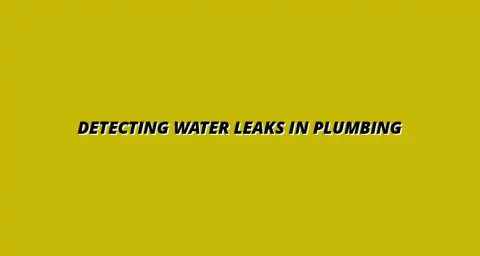
- Beginner Tips
- Jan 21
2025-01-22
Maintaining your plumbing system is crucial for keeping your home functioning smoothly. It's not just about fixing leaks or unclogging drains; regular plumbing maintenance can save you from costly repairs and ensure that your water supply is safe and efficient. Understanding why this maintenance is important helps you take proactive steps in preserving your pipes.
One of the main reasons to prioritize maintenance is that it can prevent major plumbing emergencies. Issues like burst pipes or severe leaks can lead to extensive water damage, making timely maintenance essential for any homeowner. By keeping an eye on your plumbing, you can address small issues before they become big headaches!
Regular maintenance goes beyond just fixing visible problems; it helps to enhance the overall health of your plumbing system. Think of it like visiting the doctor for check-ups — it's better to address minor concerns before they escalate into serious health issues. Here are the key reasons why you should stay on top of your plumbing maintenance:
Ignoring plumbing maintenance can lead to unexpected costs. For instance, a tiny leak may not seem significant at first, but over time it can cause major damage to your home. By routinely checking and maintaining your plumbing, you can avoid these costly repairs and the stress of plumbing emergencies.
Additionally, a small investment in maintenance can save you a fortune in the long run. You might be surprised at how much you can save just by keeping a close watch on your plumbing system! For more tips on extending the life of your home's plumbing, check out these essential maintenance tips.
Regular maintenance not only helps prevent costly repairs but also enhances the quality and efficiency of your water supply. Clean and well-maintained pipes ensure that the water you use is safe and free of contaminants. Furthermore, efficient plumbing systems can significantly reduce your water bills.
By conducting routine checks, you can make sure that your filters are clean and that your pipes are free from buildup. This ultimately leads to a healthier home environment and saves you money!
Now that we understand the importance of plumbing maintenance, let's explore some practical tips you can follow. Keeping your plumbing system in top shape doesn't have to be overwhelming. With a few regular practices, you can ensure that your pipes stay healthy and efficient.
Think of these tips as a simple guide to help you take charge of your plumbing. From inspections to cleaning, consistent upkeep can help you avoid larger issues down the line!
One of the best ways to maintain your plumbing is by performing routine inspections. By taking a little time to check on your pipes, you can catch any potential problems early. Here are some key components to look out for:
Early detection of leaks can save you a lot of trouble! If you notice any damp spots or water stains on walls or ceilings, it’s essential to investigate immediately. Keeping track of your water bills can also help you spot unusual increases, which might indicate a hidden leak.
Simple checks like inspecting under sinks and around appliances can help you catch issues before they escalate. Remember, the sooner you address a leak, the less damage it can cause!
Another important aspect of routine inspections is monitoring your water pressure. High water pressure can strain your pipes and lead to leaks, while low pressure can be frustrating and indicate blockages. You can easily check your water pressure using a simple gauge, which can be found at most hardware stores. Knowing how to prepare your plumbing for winter is crucial; find helpful tips in this winter plumbing preparation guide.
If you notice issues with your water pressure, it’s wise to consult a professional to assess your plumbing system. Being proactive about these checks can greatly enhance your plumbing's longevity!
Cleaning your plumbing system is another essential part of maintenance. Just like you clean your home, your pipes need attention too! Regular cleaning helps prevent clogs and keeps your water flow smooth.
Here are a few effective cleaning practices you can implement:
Cleaning your drains properly can save you from headaches related to clogs. You can create a mixture of baking soda and vinegar to help break down build-up in your pipes. Simply pour it down the drain, let it sit for a bit, and then rinse with hot water!
Additionally, always be mindful of what goes down your drains. Avoid putting grease, coffee grounds, or fibrous foods down the sink, as these can lead to serious clogs. If you're dealing with a clogged toilet, this guide can help. By adopting these habits, your plumbing will thank you!
If you prefer natural cleaning methods, there are plenty of solutions available. Ingredients like baking soda, vinegar, and salt can effectively clean your pipes without harsh chemicals. These natural solutions are not only safer for the environment, but they also help maintain the integrity of your plumbing.
Regularly using these natural cleaning methods can keep your pipes clear and functioning well. Just remember to be consistent for the best results!
Weather can have a significant impact on your plumbing. In extreme temperatures, pipes can freeze or burst, leading to costly repairs. It’s important to take steps to protect your pipes from extreme weather conditions.
Here are some effective temperature control measures to keep in mind:
Insulation is key to protecting your pipes during colder months. By wrapping exposed pipes with insulation, you create a barrier that helps retain heat and prevents freezing. This simple step can go a long way in preventing damage and costly repairs!
Don’t forget to check areas like basements and attics where pipes might be exposed to colder air. Insulating these areas is crucial for maintaining your plumbing's health!
In warmer weather, it’s just as important to protect your plumbing. High temperatures can lead to heat damage, especially for pipes that are not properly insulated. Make sure to keep an eye on any pipes exposed to direct sunlight.
Consider using reflective materials to shield these pipes or keeping them shaded whenever possible. This simple protective measure can help maintain the integrity of your plumbing system!
Understanding how to use your plumbing fixtures and appliances correctly can help extend their lifespan. Each fixture has specific needs and requirements that should be followed to prevent damage. Here are some best practices for proper use:
Each plumbing appliance comes with specific maintenance needs. Regularly clean and inspect these appliances to ensure they run smoothly. For example, descaling your water heater can improve efficiency and extend its lifespan. For annual water heater inspection tips, see this helpful guide.
Moreover, if you notice any unusual sounds or performance issues, don’t hesitate to address them. Catching these problems early can save you from bigger headaches down the line!
Proper care of your plumbing fixtures is essential for their longevity. Avoid using harsh chemicals on fixtures, as they can cause damage over time. Instead, opt for gentle cleaning solutions that are safe for your plumbing. For essential bathroom plumbing maintenance tips, visit this page.
Regularly check your faucets for leaks and replace worn washers to keep them functioning well. By treating your fixtures with care, you ensure they serve you well for years to come!
Seasonal checks are an excellent way to maintain your plumbing system throughout the year. Each season presents unique challenges and opportunities for maintenance. By staying ahead of these changes, you can effectively protect your plumbing.
Here’s a quick guide to seasonal plumbing checks:
As winter approaches, it’s essential to prepare your plumbing. Begin by insulating exposed pipes to prevent freezing. Additionally, disconnect hoses from outdoor faucets and drain them to avoid damage during the colder months.
Make sure to check your home’s heating system to ensure it’s operating efficiently as well. Proper winter preparation can save you from significant repair costs!
When spring arrives, it’s time for a thorough plumbing check-up! Here’s a checklist to help you get started:
By taking the time to conduct these seasonal checks, you’ll be much better prepared for any challenges that may arise. Remember, a little effort goes a long way in maintaining your plumbing system!
Many homeowners have questions about their plumbing systems and how to keep them in good shape. Understanding the ins and outs of plumbing maintenance is key to avoiding issues down the line. This section will tackle some of the most common questions I encounter regarding plumbing care.
One of the top queries is how often maintenance should be performed. Regular upkeep can save both time and money, so let's dive into some recommendations!
It's important to set a schedule for plumbing maintenance. Generally, I suggest doing a thorough check at least twice a year. However, factors like the age of your plumbing and your local environment can change how often maintenance is needed.
By following these guidelines, you can catch small issues before they turn into big problems. For instance, a small leak can lead to significant water damage if left unchecked!
Many homeowners may feel intimidated by plumbing tasks, but there are quite a few that are safe and easy to tackle on your own. Here are some DIY tasks that I recommend you try!
Taking on these small jobs can boost your confidence in plumbing maintenance. Having the right tools can make a difference. Check out this list of essential plumbing tools. Just remember, if a task feels beyond your skills, it's always best to call in a professional!
Creating a long-term plan for plumbing maintenance can set you up for success. This way, your plumbing system remains in excellent shape, and you can avoid costly repairs later. Let's explore how to build this plan effectively.
A structured plan helps keep your plumbing system running smoothly and can also help catch any issues before they escalate!
Start by drafting a clear schedule for both inspections and cleanings. This should be a mix of monthly, quarterly, and annual tasks to keep everything in check.
By sticking to this schedule, you can ensure that everything remains in great condition. It’s all about consistency!
While DIY tasks are helpful, enlisting professional help is essential for comprehensive maintenance. A skilled plumber can provide deeper insights and complete tasks that require specialized tools. For plumbing services in Billesley, Birmingham, consider checking out this local plumber.
Utilizing professionals not only saves time but also provides peace of mind knowing your plumbing is in expert hands. It’s a great investment for the long-term health of your system!
Taking the time to invest in plumbing maintenance can significantly extend the life of your pipes. With a few simple practices, you can keep your plumbing running smoothly for years to come!
This isn’t just about avoiding costly repairs; it’s also about contributing to a more sustainable home environment.
Every little bit of effort you put into plumbing maintenance pays off in the long run. Even small tasks like cleaning out your sink can prevent larger issues from arising down the line.
By staying proactive, you ensure that your plumbing system remains efficient and reliable. It's a simple investment in your home!
Lastly, embracing sustainable plumbing practices can lead to long-term benefits for both your home and the environment. Simple changes can make a big difference!
By prioritizing sustainability in your plumbing maintenance, you contribute to a healthier planet while also enjoying lower utility bills. It’s a win-win situation!
